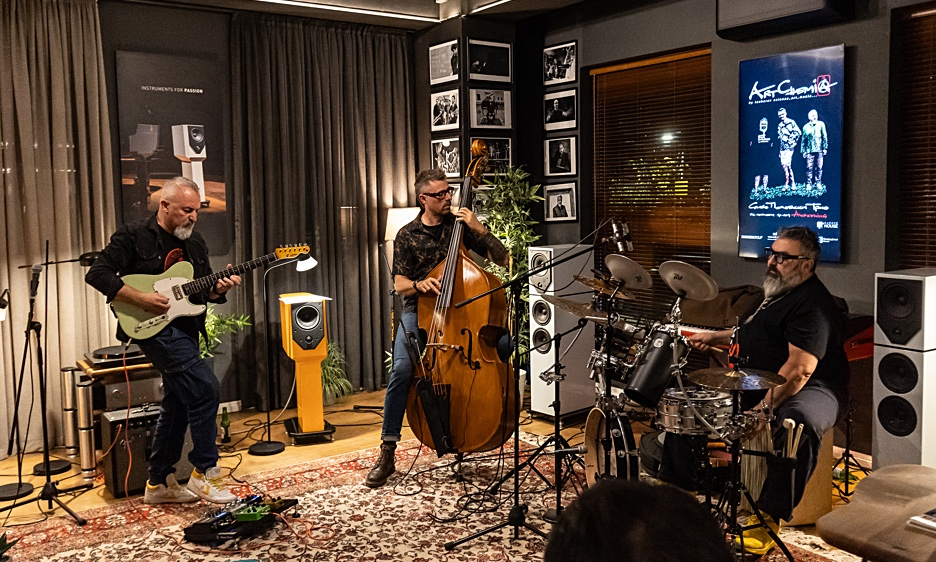Home »
Jazz Articles » Live Review » Saso Popovski Trio at Audiokultura

Courtesy Maja Argakijeva
Saso Popovski Trio
Audiokultura
Artchemistry
Skopje, Macedonia
October 28, 2025
State-of-the-art jazz bloomed Tuesday night at Skopje’s Audiokultura club, as guitarist Saso Popovski took the stage with
Ivan Bejkov
bass, acoustic
”
data-original-title=”” title=””>Ivan Bejkov on bass and Alek Sekulovski on drums. The performance, part of the Arthemija series, felt like a quiet celebration of intuitionthree musicians listening deeply, shaping something alive in real time.
They opened with “Kom Dipsan,” a piece that began in an unusual shufflea slow, rockish pulse, understated yet deliberate. Popovski’s guitar lines hovered above it, subtly riffing with rock elements woven into his touch, while Bejkov and Sekulovski weaved their own worlds underneath. For a moment, it was as if three instruments were playing three different songsuntil, suddenly, everything clicked into focus. That moment of convergence felt like jazz at its purest: structure born out of freedom.
Popovski’s tone has changed over the years. The once cerebral, sometimes too-abstract style now feels earthier, touched by rock textures and a mature sense of restraint. He builds his improvisations in phases, layering ideas in the
John Abercrombie
guitar
1944 – 2017
”
data-original-title=”” title=””>John Abercrombie school of thought, but filtered through his own experience and temperament. He no longer plays to impresshe plays to express, often following a quiet compositional thread that makes each piece feel preordained, even when improvised. By the second tune, the mid-tempo groove between Bejkov and Sekulovski had deepened into something magnetic. Bejkov drew his bow across the bass strings, coaxing out long, vocal tones that seemed to breathe with the room. And then there was Sekulovskia rhythmic wonder, holding a shaker in one hand and a stick in the other, conjuring intricate, shape-shifting patterns that gave each piece its distinct character. His playing was not just technical brilliance; it was conversational, responsive, alive. Every shift in dynamics, every accent, felt intentional yet spontaneous.
By the third tune, “Poem for Teo,” the trio had found its center. The songs were propelled by Sekulovski’s characteristic rhythmsintricate yet playful, angular in their phrasing, almost Brook-like in their unexpected turns. Popovski’s melodies floated over themsneakily angular themselves, mysterious, searching, full of longing for far-away lands. At one point, Sekulovski played the snare with his bare hands, a tambourine resting on top, creating a warm, rattling texture while Bejkov’s bow sang above. It was a moment of pure alchemy. The playfulness continued into the next piece, where swirling, almost African-inspired melodies danced over Sekulovski’s percussion. His rhythms here were intricate yet buoyant, lifting the music without ever overwhelming it. You could hear him thinking in colorscymbal washes, rim clicks, soft brush strokeseach choice adding dimension to the trio’s collective canvas.
Each song carried a sense of journey. “On Mountain Top” was all air and openness, “22 Days to Spring” brought a hint of hope and tenderness, and “Night in the Desert” unfolded like a mirageshimmering, elusive, beautiful. The trio never lost its sense of play. Even in the densest moments, there was always space, breath, and conversation.
When they returned for the encore,
Don Cherry
trumpet
1936 – 1995
Black Saint, 1977), it felt like the perfect codaa nod to the avant-garde spirit that shaped them, yet fully their own. Across the set, there were passages where each player seemed to be painting different fragments of the same picture. Then, slowly, those fragments fused into radiant colormelody, rhythm, and texture coalescing into something whole. And at the heart of it all was Alek Sekulovski, a percussion wonder whose intricate rhythms and singular character shaped every turn the music took. It was one of those nights that reminded you why live jazz matters. Nothing flashy, nothing forcedjust three musicians in dialogue, finding beauty in the act of listening.
A rare and rewarding evening at Audiokultura, and another quiet triumph for Popovskia guitarist who has grown into his voice, and now speaks it fluently.

